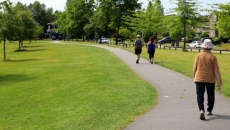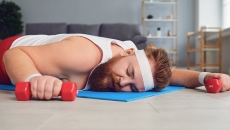Ah yes, the good old’ and generally dreadful “New Year’s Resolutions,” article which is possibly going to make you, the reader, feel like they aren’t doing enough therefore coercing you into stepping it up a notch this New Year.
Fortunately, that is not the angle that we’d like to take for this year’s article addressing the topic of New Year's resolutions, however what we’re aiming to achieve with this piece is to help reframe the way we view this entire phenomenon and how to reduce our rate of failure.
The two of us have been involved in the fitness industry for over 10 years now and each January we watch countless individuals set grandiose health goals which by the end of the month are long forgotten. We’ve witnessed many members sign up for packages with several days of access per week only to “take a (prolonged) break,” before Valentine’s Day makes it around.
This concept of biting off more than we can chew or being unable to stick to what we’ve publicly announced to everyone the night of our New Year’s Eve party is all too common. It’s almost a given that these so-called resolutions don’t last long therefore what’s the need to be upset when we eventually fall off the wagon since it’ll happen to most of us?
Depending on which sources you consult, only about 8% of New Year’s resolutions survive until the end of January. Can you believe that over 90% of us won’t make it past the four week mark?
Many of the habits which we set to alter are so deeply ingrained into our daily living therefore making the switch at the hit of a button can be a very daunting task. Long lasting change isn’t something that occurs overnight but takes time to achieve, so understanding this is foundational in reassessing our approach in the New Year.
Psychologists in the 70s and 80s developed what is known as “The Stages of Change Theory,” which displays change as occurring in the form of a step by step process.
- Precontemplation: not ready to admit that something might need to change
- Contemplation: considering that something might need to change but not ready to take action yet
- Preparation: getting ready to change by implementing supports and doing research
- Action: making the actual change
- Maintenance: keeping the change going for at least six months
As you can see, change is no simple or easy process and one must successfully make it from one stage to the next until finally they can maintain the alteration in the habit or behaviour which they are seeking. Since we set our resolutions without too much thought and generally on a whim, perhaps while we’re taking part in a toast at the New Year’s Eve party, we fail to satisfy the beginning stages of the theory. A friend suggests we lose some weight, without giving it much thought, we agree and before we know it the journey ends before it ever begins.
Furthermore, many people will set resolutions which are very broad such as exercise more, lose weight, and get organized. However, there is no way to measure success in order to determine whether we’re on our way to achieve our goal or not. This lack of specificity and direction will generally lead to failure of adherence.

Does this mean that we shouldn’t even bother with setting any resolutions?
No! We must be realistic with ourselves and understand where we currently stand then decide through a step by step process on a goal/behavioural change which on the surface may seem modest however if kept up throughout the entirety of the year will yield impressive results.
In 2022 let’s not bite off more than we can chew because if we do, when we fail we will suffer from unnecessary hardship and negative self-talk which may bleed into other areas of our lives.
Below is an example of our hypothetical approach to New Year’s Resolutions if we were in your shoes:
- Exercise 2x/week for 60 minute sessions
- Meal prep 3 meals per week in advance
- Make my bed everyday and organize my office/closet once a month
- Aim to hit 10,000 steps in a day for 4/7 days in the week
- Read everyday either 10 pages or 10 minutes

Once you’ve set the framework of your resolutions in place then it’s time to set it into motion and apply changes as the months pass. One reason for setting your resolutions in a manner where they can be open to alterations is that it allows for flexibility as life hits you with curve balls therefore instead of ditching the plan altogether you can execute on a modified version.
We recommend that after every 90 days once you see that you can stick to the plan you begin to make changes such as, exercising 3x/week for 60-90 minutes, meal prepping every weekday, or reading everyday for 20-25 minutes. In fitness we provide progressive overload in order to elicit change in the body therefore it makes sense that all other habits follow suit by starting off light then eventually increasing in volume and intensity. Don’t forget that there may be instances where instead of increasing the commitment you may be decreasing it since you see that it’s unrealistic to keep up with that level of rigor.
This year it’s important you remember that slow and steady indeed wins the race since a very large portion fail to make it to the finish line.






